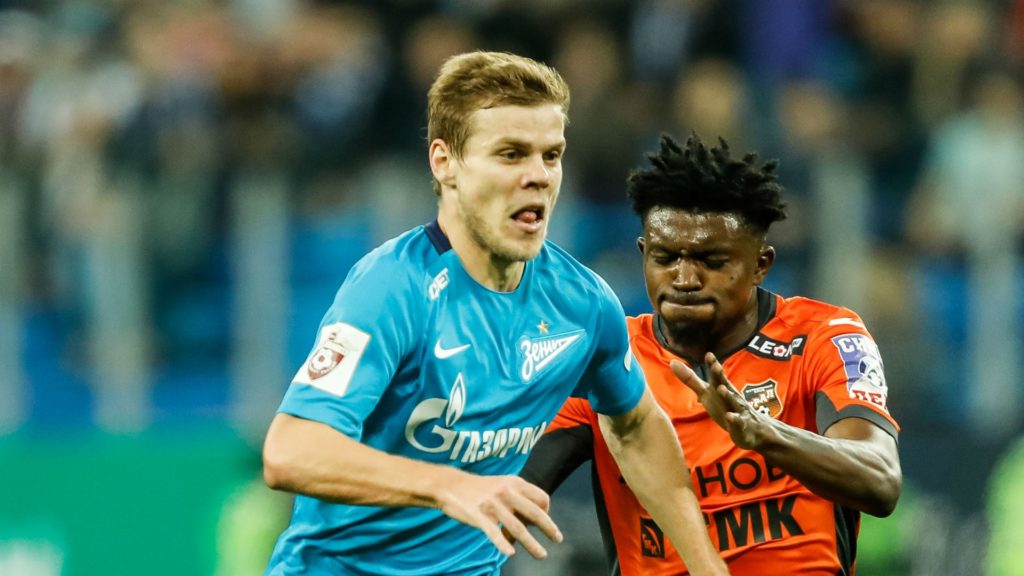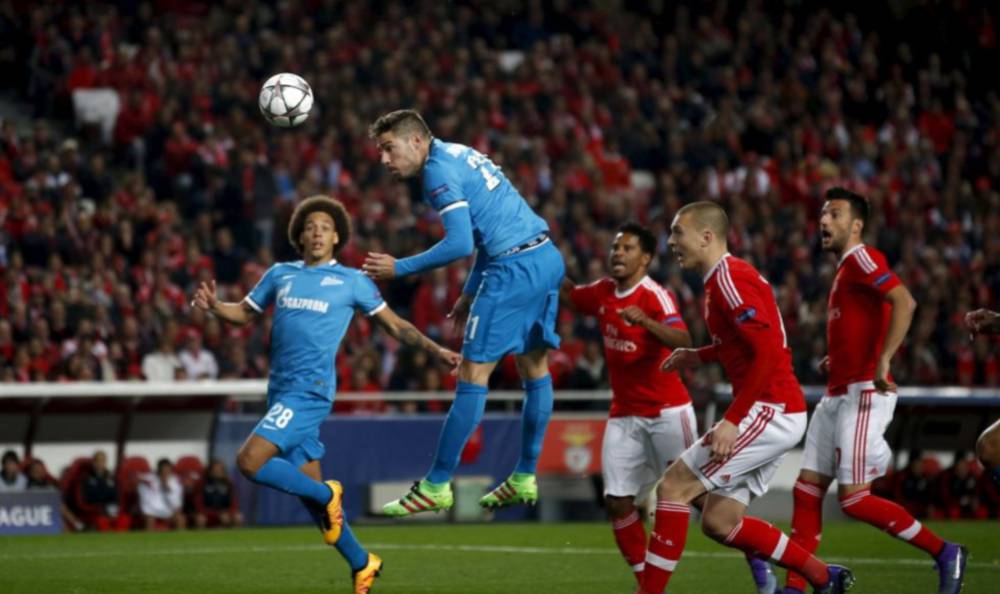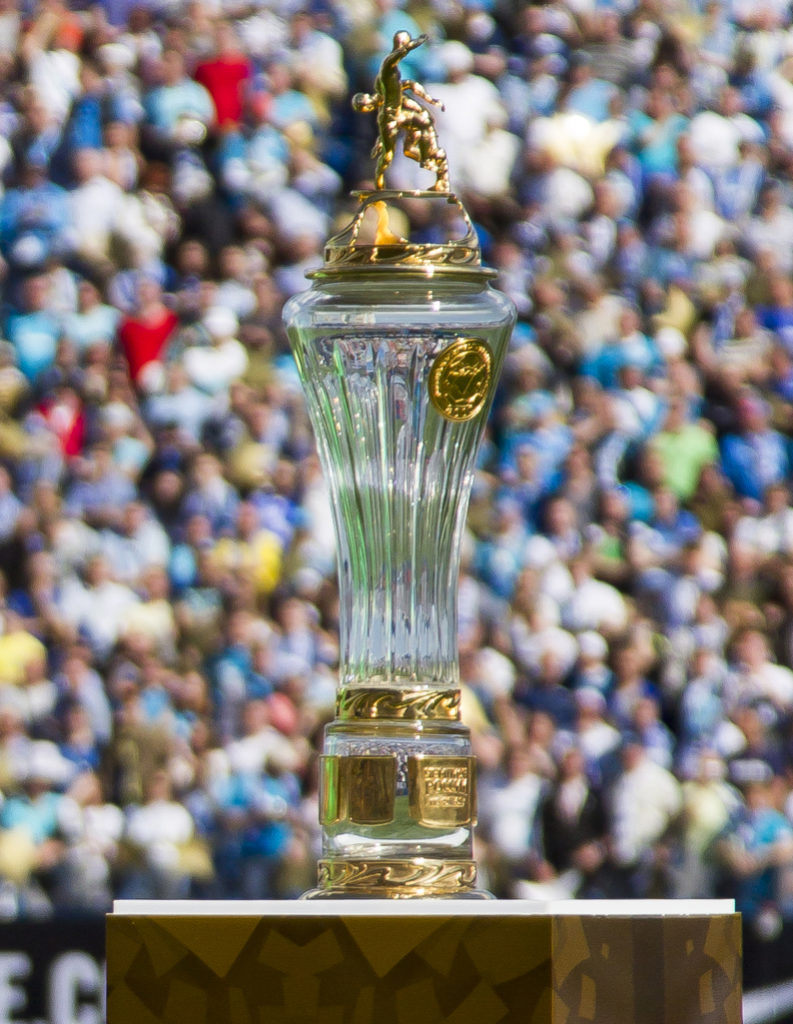Rebranded as the Russian Premier League in 2018, and equipped with an intimidating mascot, the first tier of Russian football has come a long way. The new name and image of the competition accompany a number of significant triumphs. Russian football can now boast having one of the best UEFA rankings in Europe and a proven tradition for football. Serving as hosts to the 2018 World Cup has further cemented Russia’s love affair with the beautiful game.
Fantasy football allows users to act as virtual managers, picking their ideal teams and sending them off in the pursuit of glory. FootballCoin hosts fantasy RPL contests, in which all the teams and squad members involved throughout the Russian Premier League season are included and available for recruitment.
The Russian Premier League is another football competition ideal for the use in fantasy sports, for a variety of reasons. The RPL has attracted numerous football stars in recent years. Its top clubs have an amassed impressive tradition which sees them play in front of a generous amount of fans. And, the RLP’s reputation is only growing. There is an increase in the money arriving from television rights, stadium attendances, and social media presence.
And, not least of all, the fantasy Russian Premier League contests and the teams included, represent the 146 million people living in the Russian Federation. Football is the world’s most popular sport. Russia is no exception in its embrace of football. The general’s public interest in the Russian Premier League not only helps honor the sport but the nation’s culture and history themselves.
Fantasy football in the largest country on Earth
By a large margin, Russia is the largest country in the world. It is also a highly populated one. With 146 million as of 2019, it is the ninth most inhabited country in the world. Organizing international tournaments is in itself a difficult task considering the distances that teams need to travel. Not to mention the fact that those tournaments are traditionally held one every few years. So, how does the Russian Federation manage to organize weekly matches, in a yearly competition, with so much ground to cover?
The 16 teams currently taking part in the RPL are spread out across the entire distance of the country. Many clubs come from the North-West part, with Zenit Saint Petersburg, Spartak, and Dynamo Moscow, arguably the most famous of these. Some of the clubs, such as Krasnodar and Grozny, come from South-Eastern part of Russia. And, there are even teams representing the further Eastern part with SKA-Khabarovsk having recently featured in the Russian Premier League.
The first tier of Russian football represents numerous groups of people. Because so many of them take on active interest in football, clubs have a direct avenue to becoming profitable businesses. And, because of this, some of the world’s famous players have joined the Russian Premier League. All of them have played their part in the evolution of the league.
Stadiums used for both the Russian Premier League and for fantasy football
In terms of stadium capacity and modernization, Russia has undergone a resurgence. This can be attributed to two things. On the one hand, Russian football has become more attractive in recent years leading to an increase in attendances. This justifies the building or remodeling of large stadiums.
But, more important in the recent evolution of football in Russia has been the hosting of the 2018 World Cup. In preparation for such a large event, the host nation is required to ensure that their stadium facilities are in-line with the highest standard.
During the 2016-17 season, stadiums like that in Tomsk (Trud Stadium) or that in Orenburg (Gazovik Stadium) were carefully renovated. Some important clubs even chose to have their matches hosted on separate stadiums, looking to allow work to be done on their main arenas. The Saint Petersburg Stadium and the Central Stadium in Kazan received important makeovers. Those are now some of the most modern facilities on the continent.
And, just like those venues will continue to be used to host matches in the Russian first tier, fantasy football contests are also held on stadiums, albeit fantasy stadiums. These are akin to the collectible player cards that present vital player data. The stadiums in FootballCoin are represented by a collectible card. These are used to host fantasy football contests.
Collectible stadium cards and daily fantasy football
One of the key aspects of any game is immersion. So is the case for football manager and fantasy football type games. It’s vital that users get to experience what it actually feels like to be involved in modern football at top level.
Because of this, it only makes sense that the FootballCoin contests, the private and public ones, would be organized using the information of real stadiums. The arenas and their information are added to a card. It’s done in the same way, that the game does for players. This includes the seat capacity, the club that uses it, the city of origin etc.
Similarly to the player cards, stadiums then receive a ranking of up to 5*. The rating is determined based on the number of seats featured on each of the stadiums, as well as their overall reputation. For example, Santiago Bernabeu or Old Trafford, are rated as 5* stadiums.
Setting up private fantasy football contests
The venues ranked up to 2* may be used by any of the game’s users to organize free fantasy contests. These contests, however, will have a maximum number of users that may be able to join, namely of 11 people. Organizing contests may be profitable. The one who sets it up is rewarded with a percentage of the entire prize pool that is collected.
The percentage is also determined by the rank of the stadium used to host the event. The higher-rated the fantasy stadium is, the larger the number of users that may join and the higher the rewards for the organizer. For example, arenas ranked with 5* don’t have a fixed quota on the number of people that may join the event.
The 3*,4* and 5* stadiums (as well as players that enter this category) are marked as collectible cards. These are issued on FootballCoin’s own blockchain as digital assets. They may be traded or gifted. Once purchased, they remain in the possession of their owner forever, or until they decide to sell them or gift them.
Each stadium may be used to host one event at a time. Once the contest is over, the same one can be used again to host contests representing any league, including the Russian Premier League.
The start, middle and the end of fantasy contests
There is certainly a great charm to watching a competition throughout its entire season. It’s with a sense of excitement that fans witness the ebbs and flows of results. However, what any real manager would tell you, is that is limiting to be restricted to a number of players throughout an entire season.
This is also the model used for the majority of fantasy sports. And, while it is not a bad model hence its popularity, it is one that eliminates a lot of the freedom that comes from watching the competition and getting better.
FootballCoin, on the other hand, allows you to get better about making your choices. This is a daily fantasy football game. In it, a new roster of players must be chosen for each new contest. Conveniently there are no restrictions in terms of budget. And, there are no rules about using a given player for a set number of times. Each new contest is a new opportunity.
These fantasy contests include matches from one or more of the football leagues hosted through the game. Users may choose and register their draft with 15 minutes to spare before the opening whistle of the first match in the contest. The event is then locked while all the other matches are played.
Announcing the winners of the fantasy contests
Once the final whistle of the final match has been blown, the competition has ended. The results are tallied up. To do this, FootballCoin works with Omnisport, a reputable sports statistics group. They provide detailed information which, using the scoring system, is transferred into points for each player. Once the results are in, those are provided for every single team involved in the contest and a leaderboard is drawn up.
The teams that have earned the highest number of points get rewarded. The system of rewards is announced prior to the contest’s beginning. A new contest will include a new set of matches, played under the same rules. In this way, virtual managers can track their own evolution and get repaid for keeping tabs on the competition’s progress.
The public and private Russian Premier League fantasy football events
The Russian Premier League is of great interest to many FootballCoin supporters. On the one hand, the league is growing into one of the more exciting competitions in Europe. On the other hand, because of the quality of the players, the teams, and its schedule, it is one of the most highly sought after fantasy football leagues.
FootballCoin organizes a number of its own public fantasy contests. These are promoted by FootballCoin and until now, more often than not, did not include an entry fee. Naturally, these have also been the most popular of events. The Russian Premier League matches are often featured in these type of contests.
However, the FootballCoin developers have also wanted to make sure that the game may be played and used in a variety of ways. One of these is for the users to have the opportunity to set up their own contests. As contest organizers, it is up to them to decide what leagues and matches are included, what entry fee should be paid and whether or not to restrict access to the event to a select few.
Playing against friends or taking on the fantasy fans’ community
Whether it is organizing fantasy contests for as many users as possible, or organizing it for a select group of friends, setting up a contest can be profitable. First of all, the organizer is repaid with a fraction of the entire prize pool collected for the contest. Also of importance is the growth of his reputation as the community of fantasy football fans. They may be drawn in the future to choose his events over others.
In simpler terms, if you want to join the fantasy Russian Premier League contests you may do so in two ways. One is to join a public contest. These are usually free and can include any type of FootballCoin users. The other is to join or create a private contest that may include matches from the RPL. These events usually require an entry fee upon joining them.
Choosing the ideal fantasy Russian Premier League team
As far as fantasy drafts go, there is no set formula for what constitutes a good strategy. There are many ways in which the idea of creating a top fantasy side can be approached. Now, that we have decided that there is no set recipe for creating a winning side, here are some of the elements that are frequently used in these types of teams.
First of all, when assembling a Russian Premier League side, or one representing any football league, it is vital that you know which players are under and overperforming. To best understand this, a manager must seek to know as much about the teams’ evolution as they can. And, there are few better ways of doing this than by using the detailed football stats available on the FootballCoin website.
Analyzing football stats
It also to helps take a peek at what your rivals are doing. Once any contest is completed, managers may be able to glance at the various teams having been used throughout the event. Researching the various approaches to creating a winning side can help in creating your own.
Finally, any manager worth his/her salt must remain aware of the latest developments in the football world. To help with this, FootballCoin frequently publishes blog posts. These contain information regarding scores, transfers, fantasy strategies, and even fantasy scouting tips.
Ultimately, for most users of FootballCoin or other fantasy football games, the objective will be that of choosing the right players to earn them significant points. For this, FootballCoin offers the possibility of selecting between any of the players involved in its featured leagues. These include all the squads in the Russian Premier League. The existing players are divided into two categories: free player cards and collectible player cards.
The collectible player cards
Much like building a collection of player cards for football, baseball or basketball, FootballCoin encourages its users to compile a collection representing their favorite sports stars. The collectible player cards are issued as digital assets and issued on FootballCoin’s own blockchain. The blockchain itself was developed using multichain technology.
As for the players included in this category, they tend to represent the biggest football stars in the world. This means that players like Messi, Ronaldo, Hazard, Salah, or others that have achieved great things in the world of football, will be represented by collectible cards. These type of cards are reserved for players ranked 3* or higher.
Improvements and updates to your RPL league
Until the present season, all other cards were ranked 2*. These represented the majority of cards that existed in the game and were free to be used by any of the managers taking part in contests. The Russian Premier League, for example, was one of the leagues represented in the game in which almost all of the cards of players were free. This meant that managers could win contests based solely on skill and how inspired their choices were.
The plan for the 2019/20 season is to introduce new elements to the game. These will reward users and keep them interested in fantasy soccer. One planned new feature is to introduce 1* and 2* players, the second category being that of players that may be chosen through rewards presented to those who play the game and excel at it.
Judging players, judging fantasy drafts
Naturally, it is essential at the beginning of any type of game for the rules to be known by all the participants. It is also vital that the rules remain unchanged throughout the contest. And it’s important that all players abide by the same set of rules.

To keep in line with this objective, FootballCoin has set up its own scoring system. The main principle of all fantasy games is that the managers get to choose a roster of players. These are judged based on their actual performances in real matches. FootballCoin is no exception. The scoring system sheet designates the positive and negative football events that have to be quantified in order to give an assessment of a player’s performance. Each item carries with it a number of points. These points are multiplied based on how many times the event, whether it is good or bad, takes place.
Playing Easy and becoming a Pro
To ensure that the game is well rounded and balanced, the developers have introduced a few items that change based on the type of event, or on the type of player that is being rated.
For example, the league matches can be played in two types of fantasy contests, Easy and Pro. What differentiates the two is the number of variables taken into consideration. An Easy contest might only include the essential elements such as scoring a goal or playing a full 90 minutes. The Pro challenges, however, include a vast number of variables that chart the success in areas such as long passes, dribbles etc.
Furthermore, quite rightly, the developers decided that certain events are more likely to occur based on the player’s position. For example, a striker is expected to score more often than a defender. With this in mind, the points that an individual player receives are weighed based on their position on the field. This also allows managers to create their individual strategies, opting to favor certain players or playing systems.
Winning in the Russian Premier League and what to do when it happens
When Zenit Saint Petersburg won the Russian championship in 2007 it stood as a testament to the team’s work ethic. It also served as a symbol of the fact that the Moscow dominance was finally being seriously challenged after years in which Spartak Moscow and CSKA Moscow had commanded the league.
Next, came a streak of two years in which Rubin Kazan, a team that had fought to avoid collapse a few years prior, won the league title. They did this using a considerable amount of financial backing. They also owned a great roster of players that included Brazilian forwards, Vagner Love and Welliton.
The teams that won the league then attempted to build on their success. This meant additional investments, a rise in the profile of the Russian Premier League and growth in the type of results that clubs were likely to manage in international competitions.
Creating a fantasy team for the future
Winning contests in FootballCoin should be seen in a similar manner. Victory in contests, or finishing in one of the places that bring with it cryptocurrency rewards, can help the virtual manager build his/her profile, invest in creating an even better squad, or can have them cash out their winnings.
One classic example is that of reinvesting your XFC winnings in purchasing player cards. (The new system will include a system in which performances will lead to being able to use certain player cards for a limited amount of time). Purchasing a player card at the right time can be immensely profitable. What if the manager had decided to purchase the card of Mohamed Salah just before his great achievements of 2017? The investment would have not cost a fortune and the manager would have ended up with the collectable card of one of the best players in the Premier League.
The transfer system in the real and the fantasy Russian Premier League
There are few more efficient ways of gaining the football world’s attention than by surprising it with marquee name signings. It only makes sense that football fans will be more inclined to watch stars play in the same way they may be inclined to watch a movie that features famous actors.
This is one of the things in which the Russian Premier League has excelled. The Premier Liga has attracted numerous high profile players, attracted by the competition and, frankly, by the immense salaries being offered to them. Players like Hulk, Axel Witsel, Willian, Danny or Leandro Parades all joined Russian clubs and stole the football headlines.
The RPL clubs have also shown to be capable of selling players for just as profitable deals. Many of the players brought in to brighten the Russian league has gone on to great success elsewhere. For example, Brazilian forward, Hulk, was resold to SIPG in the Chinese Super League for a fee of 55,80 Mill. €. Recently, Aleksandr Golovin‘s enthusiastic display in the World Cup secured him a transfer to AS Monaco for a fee of 30,00 Mill. €.
The full transparency of FootballCoin
FootballCoin’s transfers are done on the blockchain. Since the player cards are represented as digital assets, all transactions using those are recorded on FootballCoin’s own blockchain. This permits for any transaction to be visible, swift and carry with it no risks. The players may be purchased or sold using the FootballCoin market section. Here, the player information is presented and those interested may bid for a card. Or, they may request its purchase at a given pricing.
And, what about the frequent transfers from one league to another that happen in the real world of football? FootballCoin updates its database often and manually verifies all the players listed in the game. This is done to ensure that the users of it are able to pick between the current roster of the teams listed in the game. In short, the developers do their best for the game to mimic reality as closely as possible.
Fantasy football and the emergence of blockchain games
Blockchain technology’s utility can hardly be disputed. As we speak projects are being developed and updated that all attempt to make use of blockchain for various industries. Some of the benefits of this technology include its speed, transparency, applicability to just about any type of industry. Alo, other perks are the high number of tech-savvy blockchain specialists attempting to move the technology forward. As with any industry that promises to revolutionize certain areas of everyday life for the better, the transition is in many cases a slow one.
Cryptocurrency such as Bitcoin is one of the most prominent uses of blockchain tech. Frankly, its popularity is due to a number of reasons, chief of all, the ease with which traditional money may be substituted. XFC coin, the cryptocurrency used in FootballCoin, features the same basic functions of coins such as Bitcoin or Ethereum. Its basic philosophy is also one that adheres to the tenants upon which the initial Bitcoin project was developed.
Crypto powered blockchain games
Blockchain games are one of the newer uses of this type of technology and many of them have already acquired a good deal of popularity. Augmentors, BitQuest, Beyond the Void, Spells of Genesis have made significant waves in the crypto community and beyond. Famously, the game CryptoKitties, developed using Ethereum at its core, became something of viral sensation a couple of years ago.
FootballCoin similarly uses blockchain technology as the foundation for the game. It does so not just in an attempt to create a fully functional and entertaining game. Beyond this, FootballCoin wishes to serve as an example of how this type of technology may be integrated in real life. How many aspects of life may be improved by its use. Not least of all, how the mass adoption of cryptocurrency and blockchain is not a pipe dream. Instead, it is something that may well serve humanity and which is practical and achievable in the near future.
Cryptocurrency powered games and the advantage of playing for real rewards
Modern games, those played on a computer, tablet, or phone, have become part of our everyday life. The advantages of playing these games, as well as the disadvantage of overindulging in them, have been well established. As I am writing these I am personally tempted to think back to a few games that have been very dear to me. In these I have invested a great deal of energy.
But, for all the enjoyment they have given me, I cannot feel a tad sad. The fact is that apart from the joy of playing and the bragging rights, there is little I could take away and convert into things that could serve me in the real world. Accounts get lost, or users are prohibited from selling them. The things that are earned in the game cannot be transferred. Most often these represent merely values that can be used inside the game.
FootballCoin, however, has taken a different approach to the reward system. Simply put, the things that users win, are theirs to keep. Furthermore, the winnings are expressed into a cryptocurrency that is convertible on a number of high-profile exchanges. Besides that, the reward may also be used inside the game to bring about improvement to their user’s team and strategy.
While it seems obvious now that it has been employed, football fans are genuinely happy with the fact they can earn rewards for knowing and following football very well. They can do so in a safe, private, legal environment. They can also be part of a community of managers partaking in the same passion.
The future of fantasy football and of the Russian Premier League
The good news, in simple, and not overly enthusiastic terms, is that both fantasy sports and RPL are growing. Both are attracting new fans with each passing year, both are becoming part of the mainstream in their industries.
Football remains by far the most popular sport worldwide. And, for the last decades, it has been the most popular sport in Russia. To their credit, the clubs that make up the Russian Premier League, as well as the lower tier of Russian football, are continually attempting to improve their squads, facilities etc. in a bid to once again challenge England or Spain as one of the best European football leagues.
FootballCoin enters its third season at the time of writing and maintains its initial vision, of creating a bridge between the fascinating worlds of fantasy sports and of blockchain technology. Added to this initial idea is experience, a continuously updated game, and website, a growing community of managers. The fantasy Russian Premier League has been with FootballCoin since its beginning. And, it will continue to be involved in its future.



